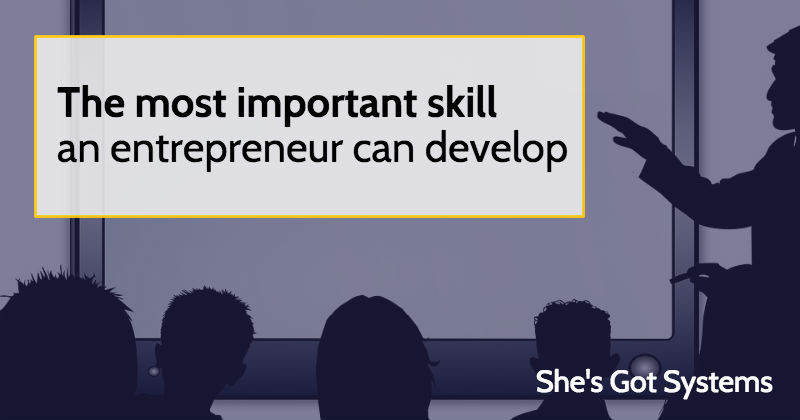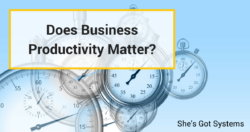When one becomes an entrepreneur all of a sudden you have to learn skills that you’d never imagined would be relevant. But there’s one above all others that will serve you every single day in immeasurable ways.
The first few years of running my freelance business and then She’s Got Systems was a constant learning experience. All of a sudden things like SEO, webforms, nurture campaigns, Click2Tweet, and merchant accounts became part of my daily lexicon and that was not even considering closing percentages, click thru rates, webinars, and retargeting ads.
It’s a little like being introduced to a foreign realm, especially if you’re not technically inclined to start.
But none of these skills were the most important. Not even copywriting, sales, digital strategy, speaking or API integrations.
Because all of these skills, while valuable, are “in the weeds” of your business. In the details. What’s more important is to take a GIANT step back and look at the whole picture.
The most important skill you can develop as an entrepreneur is discernment.
I’m sure you’ve experienced this… you’re clicking around on the internet and see an article “the fastest growing businesses use THIS sales tactic!” You open it up and see that you need a sales team to make outbound calls. On the list it goes.
Another day, another post. “If you’re not running webinars you’re flushing money down the toilet!” Webinars goes on ‘the list.’
In googling about webinars you stumble upon “Webinars are dead; interactive videos with quizzes and custom paths are in!” That goes on the list.
And on and on. It happens around team, software, strategies, marketing tactics, website design, copy, video hosting sites – in every aspect of business there are hundreds of gurus with thousands of opinions and the best thing you can do is learn how to filter suggestions and choose wisely.
We all get caught up in the excitement
No one is immune to purchasing that plugin or software that goes unused, or that domain (or 8…), we’ve all gotten excited and moved forward with something that doesn’t serve the goals of our business.
The answer is not to stop moving, the answer is discernment.
Imagine for a moment your most idiotic relative. (Don’t look at me like that, we all have one or seven.)
Now imagine you’re across the dinner table and this relative is telling you how to run your business, a company which they barely understand. Do you listen? Sure. Do you follow that advice? Probably not.
It’s all because you’re practicing discernment. You judge that this person does not have the depth of knowledge about your industry or specific subject matter expertise to advise you, and while you may nod politely, you’re never going to take that advice.
You know who does have the depth of knowledge about your business to make decisions? You do.
You’re the one who knows your goals, i.e. the kind of business you want to create. Some strategies are great to build a consulting business, but you want a software product company.
You’re the ultimate expert on your budget, so while Infusionsoft might be the bee’s knees for a bigger company, you’re the one to say ‘no thanks’ and choose a more affordable option.
You know the needs of your clients and capacity of your team, so you get to decide if a new hire is right for your company now, or later.
The absolute hardest part of this decision making is to not justify your choices to the masses.
This is where you get to be super selfish (in a good way) and say, “thanks for that suggestion!” and then in your head “but I’m not going to do that, Aunt Cindy.” or “but you have no idea what you’re talking about!”
You don’t owe anyone, except possibly investors, an answer. You owe it to your business to make the best choices you can to grow, create a stable foundation, and serve your clients.
Everything you do, day in and day out, will rely on exercising the skill of discernment. Here are the 3 steps I take when confronted with a choice:
- Consider the source – does this person know me & my business well enough to make an informed opinion? Are they benefiting from my decision to say yes as a salesperson or affiliate? Even if I don’t trust the source completely, it’s not an automatic no.
- Consider the alternatives – what would I sacrifice by saying yes? Which of my existing goals would have to be delayed in order to do this, or what budget items would I need to cut to afford it? If there are no sacrifices to be made, it’s looking good but isn’t an automatic yes.
- Compare to my goals – how will this support or distract from my goals for this month, quarter or year? Will it help me achieve those outcomes faster or more efficiently? What’s the risk if I say no?
Every single day you’re going to be bombarded by suggestions, most from well-meaning individuals, and it’s your job to filter them by discerning the best path for you and your business. Choose wisely.

 Does Business Productivity Matter?
Does Business Productivity Matter? What happens when systems fail?
What happens when systems fail? Do you love your business?
Do you love your business?